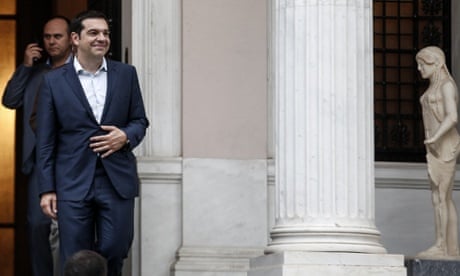
'This is what the noble European project is turning into: a grim march to the bottom. This isn’t about creating a deeper democracy, but deeper markets.' Photograph: Matt Kenyon
Aditya Chakrabortty in The Guardian
Aditya Chakrabortty in The Guardian
Nearly every discussion of the Greek fiasco is based on a morality play. Call it Naughty Greece versus Noble Europe. Those troublesome Greeks never belonged in the euro, runs this story. Once inside, they got themselves into a big fat mess – and now it’s up to Europe to sort it all out.

Eurozone creditors raise hopes of Greek bailout deal
Read more
Those are the basics all Wise Folk agree on. Then those on the right go on to say feckless Greece must either accept Europe’s deal or get out of the single currency. Or if more liberal, they hem and haw, cough and splutter, before calling for Europe to show a little more charity to its southern basketcase. Whatever their solution, the Wise Folk agree on the problem: it’s not Brussels that’s at fault, it’s Athens. Oh, those turbulent Greeks! That’s the attitude you smell when the IMF’s Christine Lagarde decries the Syriza government for not being “adult” enough. That’s what licenses the German press to portray Greece’s finance minister, Yanis Varoufakis, as needing “psychiatric help”.
There’s just one problem with this story: like most morality tales, it shatters upon contact with hard reality. Athens is merely the worst outbreak of a much bigger disease within the euro project. Because the single currency isn’t working for ordinary Europeans, from the Ruhr valley to Rome.
On saying this, I don’t close my eyes to the endemic corruption and tax-dodging in Greece (nor indeed, does the outsiders’ movement Syriza, which came to power campaigning against just these vices). Nor am I about to don Farage-ist chalkstripes. My charge is much simpler: the euro project is not only failing to deliver on the promises of its originators, it’s doing the exact opposite – by eroding the living standards of ordinary Europeans. And as we’ll see, that’s true even for those living in the continent’s number one economy, Germany.
First, let’s remind ourselves of the noble pledges made for the euro project. Let’s play the grainy footage of Germany’s Helmut Schmidt and France’s Giscard d’Estaing, as they lay the foundations for Europe’s grand unifier. Most of all, let’s remind ourselves of what the true believers felt. Take this from Oskar Lafontaine, Germany’s minister of finance, on the very eve of the launch of the euro. He talked of “the vision of a united Europe, to be reached through the gradual convergence of living standards, the deepening of democracy, and the flowering of a truly European culture”.
We could quote a thousand other such stanzas of euro-poetry, but that single line from Lafontaine shows how far the single-currency project has fallen. Instead of raising living standards across Europe, monetary union is pushing them downwards. Rather than deepening democracy, it is undermining it. As for “a truly European culture”, when German journalists accuse Greek ministers of “psychosis”, that mythic agora of nations is a long way off.
Of all these three charges, the first is most important – because it explains how the entire union is being undermined. To see what’s happened to the living standards of ordinary Europeans, turn to some extraordinary research published this year by Heiner Flassbeck, former chief economist at the United Nations Conference on Trade and Development, and Costas Lapavitsas, an economics professor at Soas University of London turned Syriza MP.
In Against the Troika, the German and the Greek publish one chart that explodes the idea that the euro has raised living standards. What they look at is unit labour costs – how much you need to pay staff to make one unit of output: a widget, say, or a bit of software. And they map labour costs across the eurozone from 1999 to 2013. What they find is that German workers have barely seen wages rise for the 14-year stretch. In the short life of the euro, working Germans have fared worse than the French, Austrians, Italians and many across southern Europe.
Yes, we’re talking about the same Germany: the mightiest economy on the continent, the one even David Cameron regards with envy. Yet the people working there and making the country more prosperous have seen barely any reward for their efforts. And this is the model for a continent.
Perhaps you have an image of Deutschland as being a nation of highly skilled, highly rewarded workers in gleaming factories. That workforce and its unions still exist – but it’s shrinking fast. What’s replacing it, according to Germany’s leading expert on inequality, Gerhard Bosch, are crap jobs. The low-wage workforce has shot up and is now almost at US levels, he reckons.
Don’t blame this on the euro, but on the slow decline of German unions, and the trend of business towards outsourcing to cheaper eastern Europe. What the single currency has done is make Germany’s low-wage problems the ruin of an entire continent.
Workers in France, Italy, Spain and the rest of the eurozone are now being undercut by the epic wage freeze going on in the giant country in the middle. Flassbeck and Lapavitsas describe this as Germany’s “beggar thy neighbour” policy – “but only after beggaring its own people”.
In the last century, the other countries in the eurozone could have become more competitive by devaluing their national currencies – just as the UK has done since the banking meltdown. But now they’re all part of the same club, the only post-crash solution has been to pay workers less.
That is expressly what the European commission, the European Central Bank and the IMF are telling Greece: make workers redundant, pay those still in a job much less, and slash pensions for the elderly. But it’s not just in Greece. Nearly every meeting of the Wise Folk in Brussels and Strasbourg comes up with the same communique for “reform” of the labour market and social-security entitlements across the continent: a not-so-coded call for attacking ordinary people’s living standards.
This is what the noble European project is turning into: a grim march to the bottom. This isn’t about creating a deeper democracy, but deeper markets – and the two are increasingly incompatible. Germany’s Angela Merkel has shown no compunction about meddling in the democratic affairs of other European countries – tacitly warning Greeks against voting for Syriza for instance, or forcing the Spanish socialist prime minister, José Luis Rodríguez Zapatero, to rip up the spending commitments that had won him an election.
The diplomatic beatings administered to Syriza since it came to power this year can only be seen as Europe trying to set an example to any Spanish voters who might be tempted to support its sister movement Podemos. Go too far left, runs the message, and you’ll get the same treatment.
Whatever the founding ideals of the eurozone, they don’t match up to the grim reality in 2015. This is Thatcher’s revolution, or Reagan’s – but now on a continental scale. And as then, it is accompanied by the idea that There Is No Alternative either to running an economy, or even to which kind of government voters get to choose.
The fact that this entire show is being brought in by agreeable-looking Wise Folk often claiming to be social democratic doesn’t render the project any nicer or gentler. It just lends the entire thing a nasty tang of hypocrisy.
Don’t blame this on the euro, but on the slow decline of German unions, and the trend of business towards outsourcing to cheaper eastern Europe. What the single currency has done is make Germany’s low-wage problems the ruin of an entire continent.
Workers in France, Italy, Spain and the rest of the eurozone are now being undercut by the epic wage freeze going on in the giant country in the middle. Flassbeck and Lapavitsas describe this as Germany’s “beggar thy neighbour” policy – “but only after beggaring its own people”.
In the last century, the other countries in the eurozone could have become more competitive by devaluing their national currencies – just as the UK has done since the banking meltdown. But now they’re all part of the same club, the only post-crash solution has been to pay workers less.
That is expressly what the European commission, the European Central Bank and the IMF are telling Greece: make workers redundant, pay those still in a job much less, and slash pensions for the elderly. But it’s not just in Greece. Nearly every meeting of the Wise Folk in Brussels and Strasbourg comes up with the same communique for “reform” of the labour market and social-security entitlements across the continent: a not-so-coded call for attacking ordinary people’s living standards.
This is what the noble European project is turning into: a grim march to the bottom. This isn’t about creating a deeper democracy, but deeper markets – and the two are increasingly incompatible. Germany’s Angela Merkel has shown no compunction about meddling in the democratic affairs of other European countries – tacitly warning Greeks against voting for Syriza for instance, or forcing the Spanish socialist prime minister, José Luis Rodríguez Zapatero, to rip up the spending commitments that had won him an election.
The diplomatic beatings administered to Syriza since it came to power this year can only be seen as Europe trying to set an example to any Spanish voters who might be tempted to support its sister movement Podemos. Go too far left, runs the message, and you’ll get the same treatment.
Whatever the founding ideals of the eurozone, they don’t match up to the grim reality in 2015. This is Thatcher’s revolution, or Reagan’s – but now on a continental scale. And as then, it is accompanied by the idea that There Is No Alternative either to running an economy, or even to which kind of government voters get to choose.
The fact that this entire show is being brought in by agreeable-looking Wise Folk often claiming to be social democratic doesn’t render the project any nicer or gentler. It just lends the entire thing a nasty tang of hypocrisy.
No comments:
Post a Comment